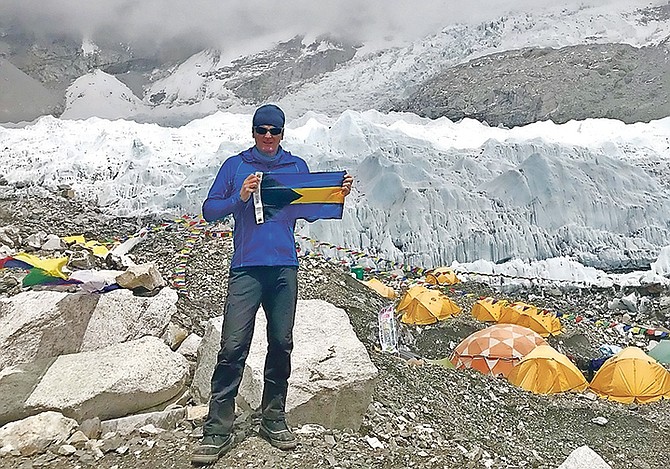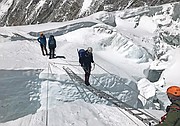Richard Beek at base camp at Mount Everest. The banker is aiming to plant the Bahamian flag at the peak in the next few days.
By RASHAD ROLLE
Tribune Staff Reporter
rrolle@tribunemedia.net
WHEN most people take a break from work they seek to rest, shop and sightsee, but not Richard Beek, the 46-year-old Bahamian banker is currently climbing Mount Everest.
Mr Beek sent "greetings from Everest" to The Tribune this week, having spent the last five weeks in Nepal doing acclimatizing routines - climbing to high camps on the mountain then back down to base camp for rest then up again to a higher camp.
Within days, he hopes to hoist the Bahamian flag atop the world's tallest mountain, becoming one of less than a handful of Bahamians known to have accomplished the feat. If he succeeds, he'd have reached the summit of the highest mountains on every continent in the world during the past 16 years.
"If a person was dropped off on the summit directly from sea level, they would die within minutes," he explained.
"Nothing is easy at this altitude. Going up and coming down in the rotations leaves you exhausted everyday. All our acclimatisation rotations up to the various camps on Everest are now done, and I'm currently resting and recuperating for the final summit push later this week."
Altitude sickness isn't Mount Everest's only killer. Avalanches, rockfalls, icefalls and crevasses pose threats too, especially when the day gets warmer.
Mr Beek knows how impregnable nature can be from past experience.
"My first attempt to summit Denali in North America was not successful and I had to go back a few years later and repeat the climb," he said.
"Unfortunately on our scheduled summit attempt we had a storm that came in and lasted for five days. We tried to wait the storm out at high camp but eventually had to retreat off the mountain. It's not fun trying to sleep fully dressed with your pack ready in case the tent blows away, with safety and potential rescue very far away. You suddenly realise and respect the force of nature. On my second attempt at Denali there were two deaths from altitude sickness."
Deaths on Mount Everest, of course, occur every year. Six people died in 2017, seven in 2016, 19 in 2015 and 17 in 2014. The last year no deaths occurred was 1977 when only two people reached the summit.
Mr Beek sent The Tribune a picture of an ice fall lying between camps and spoke of the improvisation necessary to pass the obstacle. Local sherpas, known as "ice fall doctors", erect ladders along the pathway through the ice-fall so climbers can pass when the glacier drops.
"You train with ladders at base camp so you need to trust your training, keep calm and take one step at a time," Mr Beek said yesterday.
"It takes a lot of concentration to make sure the teeth of your crampons contact the rings of the ladder correctly. Sometimes you can steal a glance through the ladder at the black abyss below. So far, we have had no accidents."
Mr Beek previously climbed to the summits of Aconcagua in South America, Mount McKinley in North America, Mount Kilimanjaro in Africa, Mount Elbrus in Europe and Puncak Jaya in Australia, so he's no stranger to altitude or Everest's cold temperature.
"I have two sleeping bags, one designed for zero degrees Fahrenheit and the other for -50 degrees Fahrenheit," he said. "You have to get into a routine and learn how to conserve body heat. A climber will wear up to five or six layers and each layer is lightweight and contains the heat close to the body."
The temperature on Everest can shift dramatically within an hour or a day.
"If it is a clear sky," Mr Beek said, "the sun is reflected off the snow on the mountain sides which can resemble an oven. If the clouds come in and it starts snowing then the temperature will plummet beyond 10 degrees Fahrenheit."
Despite his past experiences, he said Mount Everest has already been "unique and therefore different" to his previous climbs.
"Everything here is bigger, grander, cooler and more extreme," he said.
The love the Deltec Bank banker has for climbing grew from reading a book about Mount Everest as a child. His wife is apprehensive about his travails but he said he finds mountain climbing, an activity that would scare most, "therapeutic".
"I have a desk job and am in the office most days," he said.
"That is definitely the opposite to climbing and sleeping in a tent on the ice for six to eight weeks. I find climbing therapeutic as it frees your mind of the work environment, from worrying about markets and returns to the natural environment where your concerns are: am I warm enough, have I eaten enough, how am I feeling, what is the weather like, to name a few examples."
Mr Beek will leave Everest's base camp tomorrow, spend two nights at camp two and a single night at both camp three and four. He is highlighting his climb on a specially created Instagram account, everest242, though he will lose internet connection soon.
"We plan to summit between 7am and 9am on the morning of the 22nd," he said.





Comments
sheeprunner12 5 years, 11 months ago
Wonder if he can see us from up there ........ SMH
ThisIsOurs 5 years, 11 months ago
Nah, Richard you taking all of us on your shoulders and you couldn't find a bigger flag:) Good luck!
Sign in to comment
Or login with:
OpenID